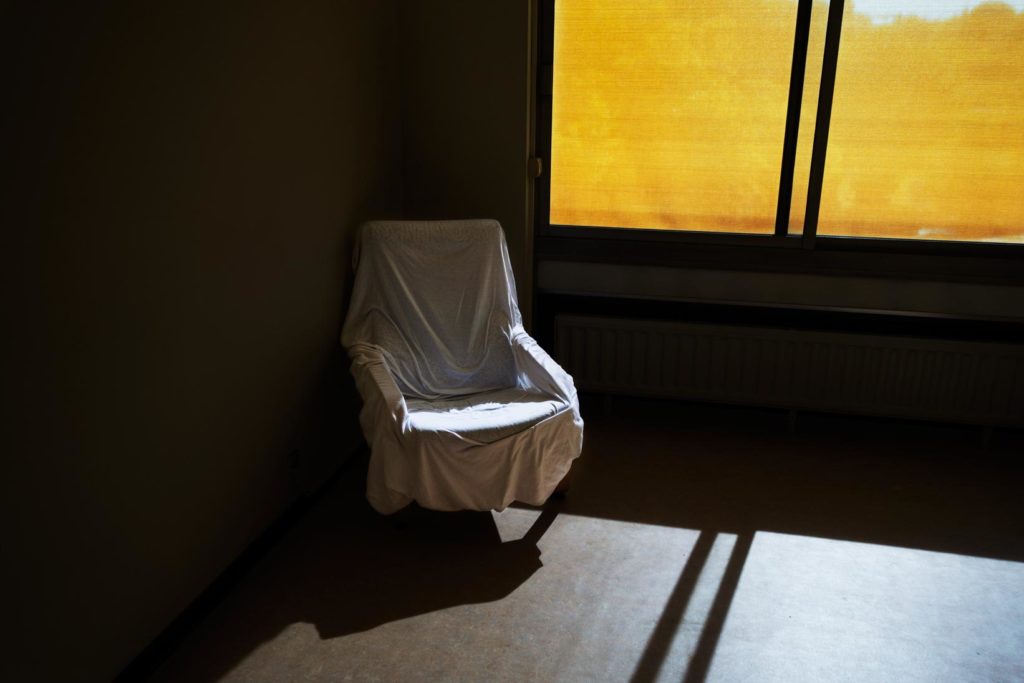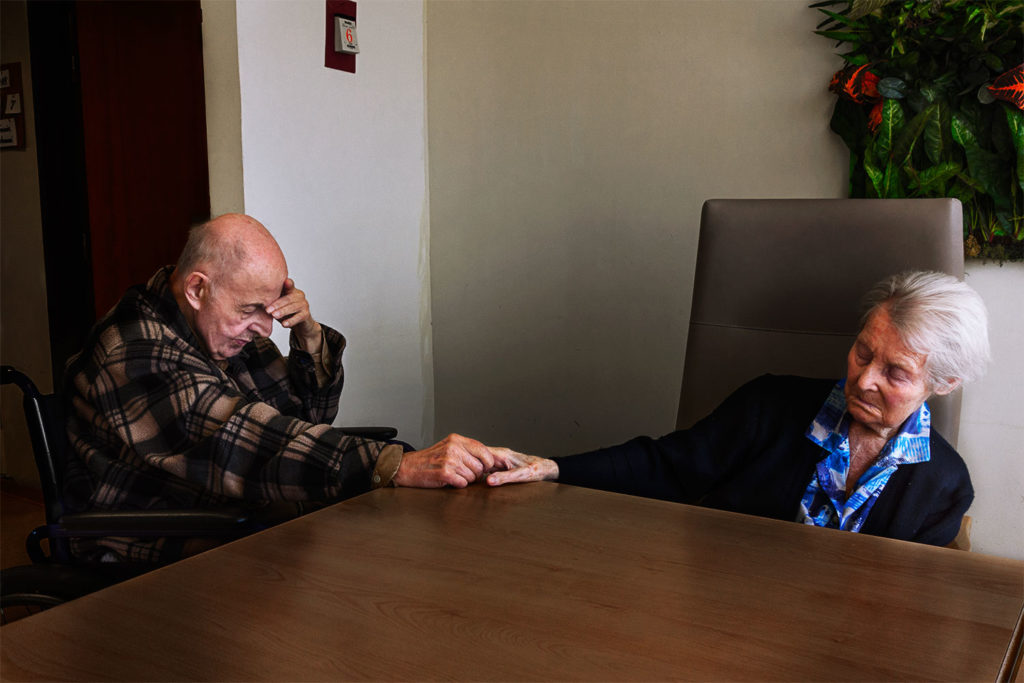12:05 p.m. The residents stand sighing before the swinging doors of the dining hall. The ones in wheelchairs are up front, all in a row. The able-bodied are in back. Mr. Jacques, a newcomer, is first. Nobody cuts the line. The doors finally open and the soup is served. The white coats hand out « elastic napkins for adults, » which are really just jumbo bibs. Ms. Yvonne waves me over and asks me to help her tie her napkin around her neck. A former gym teacher, she’s a mischievous little woman and full of energy. I like her. She looks at me with a smile: “So how do you like it here with us old folks?”
Sitting at a table in the light din of the cafeteria/canteen, I take a moment to chat with Mr. Jacques. He tells me that when he left his house for “the big trip,” he left behind everything that made him him: his social position in his village, his neighborhood, his street. At home it was the smell of his house, his kitchen, all of his personal belongings, furniture, books, photos — witnesses throughout his life. They all concealed a piece of his history, evoked a memory, told a story, aroused emotions and nourished a sense of belonging. When he left his house, he abandoned the very essence of his emotional resonance, his singularity. He doesn’t know it yet but upon entering the institution, he broke the tie with all his landmarks in favor of the immense collective, standardized, sanitized spaces of the nursing home, which are not easily appropriated. Like the others, he will have to conform to a life in a community where his image will be merely the reflection of the disability of others.”

For this work, Lionel Jusseret immersed himself in the daily life of a nursing home for a period of six months. There he encountered an invisible community which, despite itself, finds itself on the margins of society. These men and women, born between 1920 and 1945, are known as the silent generation. Having lived through World War II, they have experienced lack and worked hard all their lives. Reputed for their unassertiveness, they are described as fatalistic and conventional. This sweeping, simplistic vision pays little tribute to these Grandmas and Grandpas, whose world of flowery wallpaper echoes our childhoods, and our emotional and collective memories.
Old age is no longer popular in industrialized societies; it is the victim of negative stereotypes that result from Western values – performance, valuation and productivity – which in fact are very much geared towards youth. Old age is devalued at the expense of younger generations. “Society cares about the individual only insofar as he is profitable. The young know this. Their anxiety as they enter in upon social life matches the anguish of the old as they are excluded from it,” Simone de Beauvoir resumed in 1970. This cultural image and social discrimination on the basis of age is unable to meet the true needs and expectations of a person who has become old, is ignored and finally relegated to exclusion. The nursing home thus seems to be THE social response to the problems of ageing.
The gray economy is profitable. Paradoxically, nursing homes are one of the rare places where the person paying is not the one mkaing the decisions. « My daughter was worried about me being at home alone, so now I’m here »; “they changed my seat at the table”; “people come into my room several times a day without asking my permission and without knocking”; “they bathe me without even talking to me”; “they dress me without asking me my opinion about the choice of clothes”; “they push me in my wheelchair without telling me where they’re taking me”; “they feed me while chatting with a colleague across from them”; “I’d like to be able to take a nap but I have to stay up seated”; “sometimes I’m not hungry and they force me to eat”; “I’m thirsty and I wait ages for someone to fill my glass”; “due to the lack of personnel, I’m in discomfort for hours and no one comes to change me”; “I can wait days without having the privilege of taking a shower”; “I can wait hours before being able to go to the toilet”; “I can stay in bed in my pajamas all day.”

Such major failings, which were observed in certain establishments and exacerbated by the Covid-19 pandemic, have served to raise questions and lift the veil on the real living conditions of our elders. Largely masked, institutional treatment – with its de-personifying protocols and intrinsic reification mechanisms – once again found itself grappling with the « make do » reality, thus abandoning residents to their non-choice in the face of all-powerful healthcare rules. After the mass-distributed antidepressants came the neuroleptics, followed by chemical and/or physical restraints. Locked in their units or confined to their rooms, they spend the long hours of waiting in front of/ their TVs or staring at the cold white walls, day after day. Imprisoned in their bodies, struggling with their mental pathologies and chronic affections, this draconian environment has cut their last ties to their loved ones. “When nursing homes becomes a prison, there remains symbolic death, i.e. the development of senile dementia,” explains psychiatrist Jean Maisondieu.
Nowadays, it is socially accepted that an old man will not die at home surrounded by his family, but rather alone, isolated and in silence. Some nursing homes discreetly sneak the bodies of the deceased through the service door. The room is then cleared for the imminent reception of his or her replacement. The residents once again adapt to this cruel absence. The nursing staff hides their tears, thus keeping at an “appropriate” professional distance, the sacrosanct doctrine established by the institution. By exposing the carnage of Covid-related deaths among the institutionalized elderly population, the press has also shown how families have not been able to support their loved ones humanely. What was invisible once again, for a brief instant, has become visible: today the choice of how one lives the end of their life and die very rarely belongs to the person concerned. Like the dying themselves, families are effectively alienated from the medical profession – the true death master – which, according to the French essayist Philippe Ariès, strives to ensure that the patient’s death is acceptable and can be tolerated by their survivors. But for an elderly person who is dependent on these dehumanizing places, death is actually eagerly awaited and experienced as a release.
The silent generation is taking its leave. This book pays homage to it, is a testimonial to the conditions of the end of its life and raises questions. Why are so-called developed countries no longer capable of caring for their elders with dignity? No one wants to spend the end of their life alone and abandoned. As we wait for those whose turn it is next, for our parents, and finally for ourselves, this is one question among many we will have to answer.